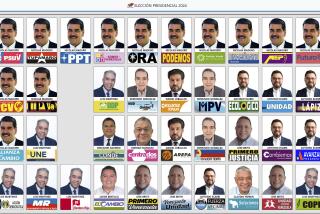1 Million Costa Ricans Vote; Nicaragua Relations a Major Issue in Long Campaign
SAN JOSE, Costa Rica — This Central American nation voted noisily for president Sunday, ending a long electoral campaign that reflected the people’s growing hostility toward Marxist-led Nicaragua.
Altogether, an estimated 1 million Costa Ricans cast ballots to choose among six presidential candidates on the ballot. However, only two of the candidates were considered serious contenders--Oscar Arias from the National Liberation Party and rival Rafael Angel Calderon of the Social Christian Unity Party.
One-Term Limit
The winner will replace Luis Alberto Monge, a National Liberation leader who is finishing a four-year term and could not legally be a candidate to succeed himself. Seats in the Legislative Assembly and city hall posts were also at stake.
The polls opened at 5 a.m. with a continuation of the festive atmosphere, replete with horn-honking street processions and electoral dance parties, that characterizes elections in this country, one of only a handful in Latin America that can be called authentic democracies by U.S. measurement.
Of the two leading candidates, Arias, 44, picked up strength in recent weeks, observers said, mainly by overcoming intraparty squabbles and emphasizing peace with Costa Rica’s neighbors.
Calderon, 36, was more bellicose toward the Sandinista government of neighboring Nicaragua. That stance, along with his offer of more clear-cut changes in domestic policies, may have unnerved Costa Rica’s middle-of-the road voters.
The leading candidate with at least a 40% plurality will be the winner under Costa Rican law.
Both Arias and Calderon agreed that Nicaragua is a threat in one way or another to Costa Rica’s stability. The United States, which currently aids rightist rebels fighting the Sandinista government, has long campaigned here for a tough stand against Nicaragua.
“We, the Costa Ricans, don’t have fraternal relations with Nicaragua,” said Arias, who has served in the Cabinets of past National Liberation governments.
“Marxist-Leninist countries are by nature expansionist. Costa Rica would be a target.”
Arias was less than clear about whether he thinks that the United States should continue to help the anti-Sandinista rebels.
He said that he favors the aid if it is used to press the Sandinistas to negotiate with opposition elements, but he added that such pressure has not succeeded. Arias pledged to restrict anti-Sandinista rebels operating from Costa Rican territory.
“We don’t want our land, liberty or hospitality used (by the rebels),” he declared during a campaign press conference.
Calderon asserted that “Costa Rica cannot be neutral in the East-West struggle” and would always “side with the West.”
He said that normal relations with Nicaragua can only be restored when Managua “respects” Costa Rica.
U.S. aid to the anti-Sandinista rebels “should stop when Cuba and the Soviet Union stop supporting Nicaragua,” Calderon declared.
He hedged about whether he might permit Costa Rican territory to be used openly as a base for anti-Sandinista rebels, saying that it is difficult to secure the frontier between the two countries.
Border Trouble
Simmering unhappiness with Nicaragua erupted into full-blown public resentment last spring when two members of Costa Rica’s Rural Guard, a small police force, were killed during a border raid by Nicaraguan troops. Soon afterward, Costa Rica withdrew its ambassador from Managua and has not replaced him.
Irate Costa Rican rightists tore down a plaque with the seal of Nicaragua that hung over the Nicaraguan Embassy building here and recently pelted pro-Sandinista peace marchers with rocks.
Monge’s government authorized the United States to train a 700-member counterterrorism force as part of the Rural Guard. The training raised fears that Costa Rica might be re-establishing an army, about 40 years after the military was abolished here.
Both Arias and Calderon say they would maintain the U.S.-trained unit.
Polls have shown that a large majority of Costa Ricans are critical of the Sandinista regime. They have also shown that Costa Ricans are opposed to doing anything directly to topple the Sandinistas. That attitude has led both main presidential candidates to tone down any talk of confrontation with Managua.
The other big issue of the campaign has been Costa Rica’s struggling economy.
During many years in power, Arias’ party has nurtured an extensive welfare state. Arias has pledged to control public spending, but he is promising the creation of 100,000 new jobs and the construction of 80,000 houses during his term. He also has promised not to cut government jobs.
Calderon said he plans to reduce government jobs by attrition through retirement. He also wants to shift the burden of job-creation to business and re-establish privately owned banks to ease credit for industry.
Both said they will seek easier terms for repayment of Costa Rica’s foreign debt, a burden that eats up about half of the country’s annual foreign exchange earnings.
More to Read
Sign up for Essential California
The most important California stories and recommendations in your inbox every morning.
You may occasionally receive promotional content from the Los Angeles Times.










